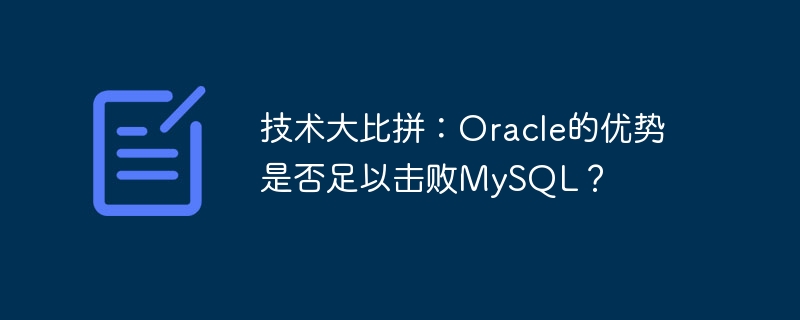Home >Database >Mysql Tutorial >Technology Competition: Is Oracle's Advantage Enough to Defeat MySQL?
Technology Competition: Is Oracle's Advantage Enough to Defeat MySQL?
- PHPzOriginal
- 2023-09-09 11:51:311016browse

Technology Competition: Is Oracle’s Advantage Enough to Defeat MySQL?
With the rapid development of the Internet, database technology has become more mature. In the database field, Oracle and MySQL have become the two giants in the industry with their powerful functions and stability. This article will conduct a comparison between Oracle and MySQL to explore whether Oracle's advantages are enough to defeat MySQL.
First, let’s take a look at the difference between Oracle and MySQL. Oracle is a relational database management system (RDBMS) that has a reputation for high availability and reliability in enterprise-level applications. MySQL is a lightweight relational database management system that emphasizes ease of use and open source.
So, what are the advantages of Oracle over MySQL?
- High performance: Oracle can handle a large number of database transactions through meticulous database management and optimization technology. It uses advanced query optimizer and indexing technology to make database queries very fast.
- High availability: Oracle has strong fault tolerance and recovery capabilities and can automatically transfer to a standby database in the event of a system failure. This means that even if a hardware failure or network outage occurs, the database can still keep running.
- Rich functions: Oracle provides many powerful tools and functions, such as data replication, data migration, backup and recovery, etc. These capabilities enable Oracle to meet a variety of complex business needs.
- Scalability: Oracle supports horizontal and vertical expansion and can easily handle large amounts of data and concurrent requests. It can automatically allocate and manage system resources to ensure the stable operation of the database.
Although Oracle has obvious advantages in terms of functionality and performance, MySQL also has its own advantages:
- Open source and free: MySQL is an open source database and can be downloaded for free and use. This enables small businesses and individual developers to build their own applications using MySQL, reducing development costs.
- Easy to use: MySQL has an intuitive user interface and simple command line tools, making database management and operation simple. MySQL is an ideal choice for beginners and non-experts.
- Strong community support: Because MySQL is an open source database, it has a large developer community. Community members can share and exchange their own code and experiences, so that MySQL problems can be quickly solved.
Although Oracle and MySQL both have their advantages, in actual applications we should choose the appropriate database according to the specific situation. Here is a simple code example to demonstrate the differences between Oracle and MySQL:
Oracle sample code:
SELECT * FROM employees WHERE department = 'IT';
MySQL sample code:
SELECT * FROM employees WHERE department = 'IT';
As you can see from the example It turns out that Oracle and MySQL are very similar in the usage of SQL statements, so there is not much difference for developers.
In summary, although Oracle has obvious advantages in terms of functionality and performance, MySQL is also a good choice for small businesses and individual developers. Therefore, in a technology competition, whether one database outperforms another must be decided based on specific needs and circumstances. Regardless of whether you choose Oracle or MySQL, as long as you can make reasonable use of their advantages, you can build stable and efficient applications.
The above is the detailed content of Technology Competition: Is Oracle's Advantage Enough to Defeat MySQL?. For more information, please follow other related articles on the PHP Chinese website!

